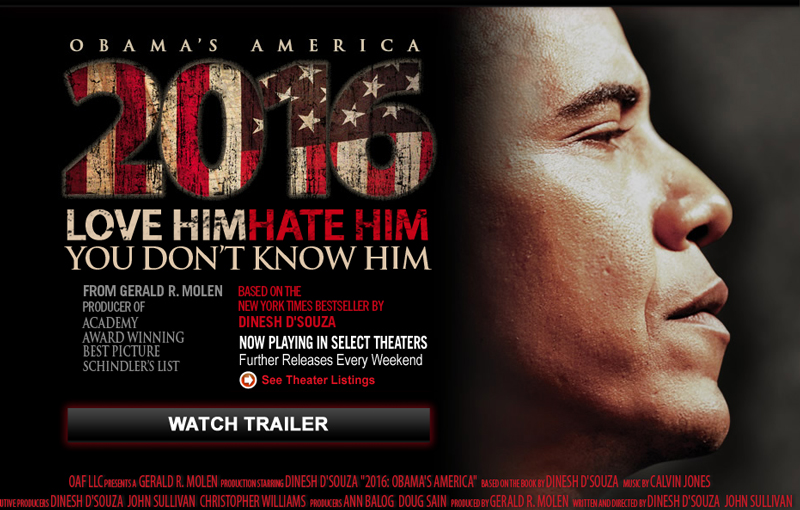A new film, critical of President Barack Obama, went nationwide in nearly 1,100 theaters last weekend, and I dropped into a mid-afternoon showing, without high expectations.
In my experience, films expounding a conservative viewpoint often seem to have been made in somebody’s basement by high-school drama-club dropouts.
Well, I was wrong. The film, “2016: Obama’s America,” is fully professional and engrossing, which it should be, considering it was produced by Gerald Mohlen, who also produced such films as “Schindler’s List,” “Rain Man” and “Jurassic Park.”
The concept came from a pair of books authored by conservative commentator (and Indian immigrant) Dinesh D’Souza, covering Obama’s family and political history.
The film’s been called propaganda, but it’s not — and that has nothing to do with its topic. “2016” is a polemic (an argument made to advance a cause), and the worth of a polemic depends on the soundness of its argument and the importance of its cause.
You don’t have to buy into all the film’s points to see its argument is well-constructed. Whether it covers all the relevant territory or justifies the filmmakers’ full conclusions is for viewers to decide.
There are no surprises to reveal, so here’s a brief version of the film’s argument, as presented by D’Souza, who narrates the film and interviews a wide variety of sources, ranging from a left-wing Kenyan journalist to Obama’s half-brother George to a former comptroller general of the United States.
Obama himself is a strong presence in the movie, as the CD version of his autobiography, “Dreams from my Father,” is used as a voice-over.
D’Souza believes that Obama’s formative years were badly marred by the absence of his father, Barack Obama Sr., who met and married the future president’s mother, Stanley Ann Dunham, while he was still married to a woman in his native Kenya.
The elder Obama soon abandoned his American bride and young Hawaiian-born son and returned to Kenya, and after that only made one visit to his son, though they corresponded via letters.
The son idolized his absent father, who died in a car accident in 1983, and Obama Sr.’s writings and, some say, Stanley’s sympathetic accounts of his beliefs, gave the younger Obama the “dreams” of his book’s title.
So he was inculcated with an “anti-colonial” and anti-Western worldview that blamed the industrial West for exploiting the Third World’s resources and thus creating all of its problems.
While Obama was still young, his mother divorced his father and married Lolo Soetoro, who moved the family to Indonesia and embraced a Western, pro-capitalist lifestyle, causing Stanley to spurn him.
Obama was sent back to Hawaii to live with his maternal grandparents, and in later years came under the influence of several hard-left personalities, including Communist Party activist Frank Marshall Davis (referenced eight times in Obama’s book) along with Chicago political ally and former Weatherman bomb-maker William Ayers, Israel-hating agitator Edward Said, “God damn America” preacher Jeremiah Wright and Harvard professor and Brazilian socialist theoretician Roberto Unger.
In the end, D’Souza concludes, the kind of country we are headed for by 2016, if Obama wins re-election, has been foreshadowed by his actions so far — hostility to former colonial powers like Great Britain, sympathy for “oppressed peoples” like the Palestinians, disdain for Israel as a junior-league oppressor, and a deep-seated desire to “cut the United States down to size” by swelling its debt and greatly reducing its military power, including its nuclear arsenal.
The film makes a strong case, but even if you find it unconvincing, at least it illuminates significant portions of Obama’s background that he and the major media have so far successfully downplayed.
Indeed, as John Hinderaker noted in the conservative “Powerline” blog, you don’t have to look only at Obama’s father to find the sources of his worldview.
His long-term academic and social relationships, which reflected the hard left’s view of the United States as the major force for oppression in the world, provide plenty of fodder for creating the most left-wing president the United States has ever had.
The film is reportedly doing extremely well at the box office, even in some very “blue” areas. The showing I attended, in Portsmouth, N.H., was perhaps two-thirds full of mostly middle-aged and older viewers, and was marked with some applause at the end.
It has one unfortunate gap, in which D’Souza too briefly compares Obama’s statist worldview to the free-market, individual-liberty-loving views of the Founding Fathers.
Considering the state of U.S. education today, he should have had a credentialed historian describe the government the Founders created and compare it to how Obama and other progressives have been transforming it.
Making the individual-rights-versus-state-power contrast explicit would have strengthened the film’s final moments.
Not that it pulls many punches along the way. See it, and decide for yourself.
M.D. Harmon, a retired journalist and military officer, is a free-lance writer and speaker. He can be contacted at mdharmoncol@yahoo.com
Send questions/comments to the editors.



Success. Please wait for the page to reload. If the page does not reload within 5 seconds, please refresh the page.
Enter your email and password to access comments.
Hi, to comment on stories you must . This profile is in addition to your subscription and website login.
Already have a commenting profile? .
Invalid username/password.
Please check your email to confirm and complete your registration.
Only subscribers are eligible to post comments. Please subscribe or login first for digital access. Here’s why.
Use the form below to reset your password. When you've submitted your account email, we will send an email with a reset code.